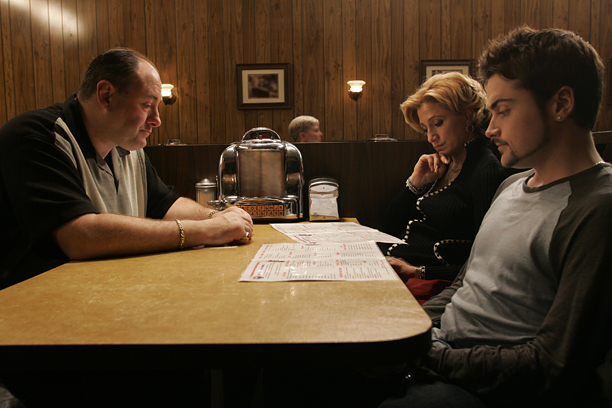'You do the work' - The finale of The Sopranos
Topicality has never been a priority of this blog, but even so, writing about something that reached its conclusion sixteen years ago is a lot more than a little overdue. Great shows, though, have the ability to linger and chime with what's happening in the wider world. And so it is with The Sopranos.
 |
"Don't stop believing"? |
An hour before sitting down to watch the final episode, I learned that the private jet of Yevgeny Prigozhin had been blown out of the sky. The leader of the Wagner mercenary group, initially employed by Vladimir Putin to help wage war against Ukraine before turning on the Russian President and marching on Moscow, is believed to have been onboard. Looking at photographs of Prigozhin would draw out comparisons with Tony Soprano (played magnificently by James Galdolfini) even if Putin's former chef had remained in that position, rustling up pirozhki for a man who probably thinks twice - and then once more - about every single thing that he puts in his mouth.
Notwithstanding the differences in scale between the New Jersey and New York mob and a nuclear superpower, there are common denominators between both stories. Essentially, we are observing - one in real life, one in fiction - lawless and violent gangsters go about their business. Furthermore, that David Chase's drama is a stunning and nuanced exposition of toxic masculinity, also offers up a striking insight into the power struggles in Russia. Thinking back to June and Prigozhin's aborted rebellion, I recall a flurry of think-pieces, tweets and social media discussions, that reveled in the 'bad-ass' character of the leader of the mercenaries. The more considered pieces took partial care - a kind of 'be careful what you wish for here' sentiment - but for the most part the admiration ranged from fear and awe to full on cheerleading. It's not an original thought, but a lot of men do love a gangster.
Turning away from the real world and Putin and Prigozhin's horrific war crimes, and returning to The Sopranos, the wonderfully provocative final scene gives us much to mull over. Tony Soprano sits with his wife and son in a diner. He's selected Journey's 'Don't Stop Believing' on his tabletop jukebox. His daughter, Meadow, may or may not have just walked through the door. Tony looks up, his expression somewhere between neutral and the merest hint of surprise. The screen goes black. A few seconds pass and the music and credits roll. That's it.
Without overly analysing what this means - 'Is Tony Soprano dead or alive?' - and closure is overrated, unless, rather pertinently in this case, it is in therapy - the more pressing question is: 'What does this mean for you?' As someone who has engaged in 86 episodes of stunning television, do you desire Tony to go on living, or do you feel justice would be served if he was 'whacked'? Essentially, do you admire Tony or do you despise him? If you've been paying attention, it's the latter. He is unequivocally a monster. Even if you have laughed with him, rooted for him at times (grading him as a lesser villain in an hierarchy that we all employ when it comes to morality), perhaps warmed to a partial 'breakthrough' in his therapy, looked out for his wife and two children: he remains a monster. As indeed Dr. Jennifer Melfi, his therapist, realises in the penultimate episode.
Tony is not a better person than Phil Leotardo. You have just had the opportunity to spend more time with him and know him better. Likewise, Putin is not worse than Prigozhin. They are both as monstrous as each other. One just has nuclear capability and a fancier palace.
The screen going black for a few seconds is an invitation then. Pick up one of your favourite books - I'm reaching for The Great Gatsby - turn to the final page, and then see what follows afterwards. It's almost certainly a blank white page. It is your invitation to think about how you feel about what you have just read. Likewise, with the close to The Sopranos - black rather than white, as the latter would perhaps come with too much direct symbolic baggage (yes, I do feel a white light would be more suggestive than darkness). As with therapy, you do the work.
Which of course leads you to the most important question of all regarding The Sopranos. If your final analysis is that Tony Soprano is a monster, then why spend the better part of a year gripped and fascinated by that story? Dr. Jennifer Melfi, of course. Without her, the series would be merely a competent yet ordinary mafia soap opera. With her, it becomes an amazing piece of television. It is not so much Tony Soprano who is in therapy, but rather Dr. Melfi and - if, once again, we have been paying attention - ourselves. Like Dr. Melfi, we learn that Tony Soprano is ultimately unredeemable. The Sopranos - despite its occasional comedy, its fabulous use of music, its awful mobster chic aesthetic (Putin and his palace have been paying attention), its women and eventually children exercising preposterous levels of cognitive dissonance, its tangents involving the American Catholic church and the FBI and the War on Terror - is ultimately an object study in evil that hones and calibrates and leads us towards recognising the real thing. And as the Russian president and his stooges make all too clear, it's out there and isn't going away.





Comments
Post a Comment